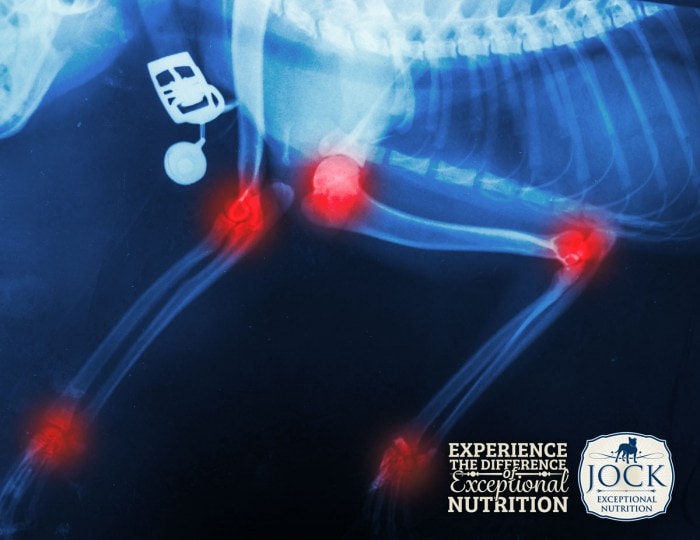Did you know that unlike with humans, arthritis in dogs is not caused by old age? Rather, it’s caused by a range of other factors, including obesity, autoimmune disorders, injury, developmental disorders like dysplasia, unnatural growth especially in large breed puppies due to an imbalanced calcium/phosphorus ratio in their diet, and even bacterial infections. Arthritis is, however, the main cause of chronic pain in dogs and affects one in five adults. We spoke to our resident expert veterinarian, Dr. Ockert Botha (BVSc) about the signs and treatment of the disease, and what you should do should your dog suffer from canine arthritis.
What is Arthritis?
Arthritis is a degenerative disease that causes loss of mobility and pain. It is caused by the thinning of joint cartilage, which can lead to excessive joint fluid and inflammation of the joint capsule. In severe cases, the bone beneath the cartilage cap can deteriorate and lead to bony growths developing. This can cause your dog immense pain when moving, and can lead to lameness, limb disuse and inactivity, as well as muscle atrophy.
Types and Causes
There are several types of canine arthritis. All have similar effects on your dog, but osteoarthritis is the most common. This form of arthritis can be caused by dislocations, vigorous exercise, wear and tear, trauma, hip dysplasia, elbow dysplasia, obesity and osteochondrosis. There are also septic and rheumatoid arthritis and Lupus. Septic arthritis is caused by joint infection, resulting in severe damage to the joint surface. Rheumatoid arthritis and lupus are less common and are caused by your pet’s immune system attacking itself.
Symptoms
Majority of people notice that their dogs are challenged by common activities and are generally less active. They will struggle walking up stairs, climbing up onto the couch or getting into the car. In more athletic canines, indications of arthritis are things such as shortened play time in the park or a decreased running ability. Other signs of arthritis include stiffness in the morning or after sleeping, licking or biting of joints, as well as occasional whimpering or yelping.
Treatment
If you have a suspicion that your dog might have arthritis, an examination by a veterinarian is best. The earlier the better, as prevention and retardation of the disease is possible to some extent. The examination will also provide information on whether the condition is chronic or acute, and also if it is severe, intermediate or mild.
Treatments for arthritis vary greatly, but non-steroidal anti-inflammatory drugs are often the first choice, as they effectively, safely and quickly reduce the pain and inflammation. In severe cases, surgical treatments may be necessary, ranging from arthroscopic cleaning of a joint or its total replacement.
Special joint diets containing omega 3 fatty acids, glucosamine and chondroitin are also recommended. It is also vital to keep your dog’s body in good condition as unnecessary body weight puts stress on your dog’s joints, which can cause or worsen their arthritis.

